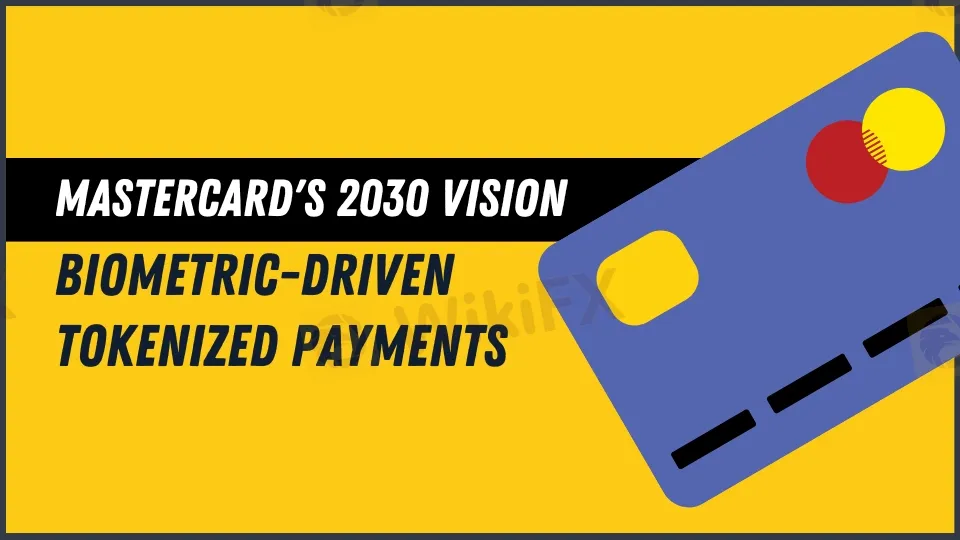简体中文
繁體中文
English
Pусский
日本語
ภาษาไทย
Tiếng Việt
Bahasa Indonesia
Español
हिन्दी
Filippiiniläinen
Français
Deutsch
Português
Türkçe
한국어
العربية
Mastercard's 2030 Vision: Biometric-Driven, Tokenized Payments
Abstract:Mastercard’s tokenized future will eliminate card numbers and passwords by 2030, ensuring seamless, secure, and biometric-driven online shopping experiences.

Mastercard is reshaping online shopping with its bold vision for 2030, aiming to create a world where physical card numbers, passwords, and one-time codes become obsolete. Instead, secure on-device biometrics and advanced tokenization will ensure seamless, safe authentication for online purchases, protecting personal data while reducing checkout friction.This idea is based on tokenization, a process released by Mastercard a decade ago to protect sensitive payment information. Mastercard intends to merge this with biometric authentication by 2030, enabling the tokenization and authentication of all online transactions. This transition is intended to remove manual card input, minimize fraud, and increase consumer comfort, resulting in a more efficient purchasing experience.
Despite its advancements, online purchasing remains a difficulty. Fraud rates are still seven times greater online than in-store sales, with exposed card details being the biggest danger. According to a Mastercard study, two-thirds of customers have difficulty with manual card entry, and 25% of carts are abandoned owing to sluggish or complicated checkouts. Mastercard's vision specifically addresses these issues.

Another component of this future is the use of several physical cards, which reduces the danger of fraud if a card is lost or stolen. Tokenization is already increasing transaction approvals by 3-6%, resulting in an extra $2 billion in worldwide monthly sales for merchants while decreasing fraud rates.
Jorn Lambert, Mastercard's Chief Product Officer, emphasizes the importance of these developments. As payments become more smoothly integrated into trade, we are leading the drive to build a global economy that benefits everyone. We provide customers with better ease and peace of mind by securing sensitive data using superior encryption and tokenization.
Partnerships and worldwide adoption have fueled Mastercard's growth. Today, more than 30% of its transactions are tokenized globally, with areas like India approaching 100% for e-commerce. Technologies like the Mastercard Payment Passkey Service and Click to Pay are gaining traction throughout the world, with top banks, payment providers, and retailers supporting them. Axis Bank, BigBasket, Razorpay, and others are among the participating partners.The company's innovation extends to its physical goods, such as the phase-out of the magnetic stripe in favor of more secure technology. This dedication to innovation ensures that Mastercard is poised to meet the changing demands of customers and businesses.Mastercard's solutions not only enable quicker, safer checkouts, but also give substantial advantages to banks, companies, and consumers. The benefit extends throughout the whole payments ecosystem, from reducing fraud to increasing sales growth.
Final Thoughts
Mastercard's 2030 goal transform digital commerce, making it safer, quicker, and more convenient. Mastercard is raising the bar for online purchasing by combining modern security technology and global cooperation. Whether it's limitless cards or tokenized transactions, the future promises an age in which payment friction is eliminated, opening up boundless potential for companies and providing customers with peace of mind.

Disclaimer:
The views in this article only represent the author's personal views, and do not constitute investment advice on this platform. This platform does not guarantee the accuracy, completeness and timeliness of the information in the article, and will not be liable for any loss caused by the use of or reliance on the information in the article.
Read more

Philippines Cracks Down on POGOs and Rising Crypto Scams
As the Philippines intensifies its POGO crackdown, experts warn of a surge in underground operations, including crypto scams and espionage activities.

Former Binance Executive Files Lawsuit Over Bribery Allegations & Unfair Dismissal
A former senior employee of Binance’s UK division, Amrita Srivastava, has initiated legal proceedings against the cryptocurrency exchange, alleging both bribery and wrongful termination.

Coinbase Plans Expansion in the Philippines to Boost Crypto Growth
Coinbase plans to expand in the Philippines, aiming to increase crypto adoption and grow the blockchain economy with a new country manager.

Filipino Investment Scam Fugitive Deported from Indonesia
Hector Aldwin Pantollana, a Filipino investment scam suspect, is deported from Indonesia after scamming millions. Authorities vow justice for the victims.
WikiFX Broker
Latest News
Philippine Banks Launch PHPX Stablecoin to Transform Payments
Broker Review: Is FOREX.com a solid Broker?
Tether to Discontinue EURt Stablecoin Amid Regulatory Shifts in Europe
Adani’s Bribery Scandal! SEC Charges, Major Fallout & Adani’s Stand
Unleash Your Trading Skills: Join the WikiFX KOL India Trading Competition!
NAGA Adds UAE, Saudi Stocks to Platform with Zero Commissions
ED uncovered 106 Crore "Nagaland Crypto Scam"
Smart Prop Trader to Close Doors in December 2024
Meme Coins: Fleeting Fortune or Financial Folly?
Philippine Scam Ring Targets Aussie Men with Fake Crypto Offers
Currency Calculator


